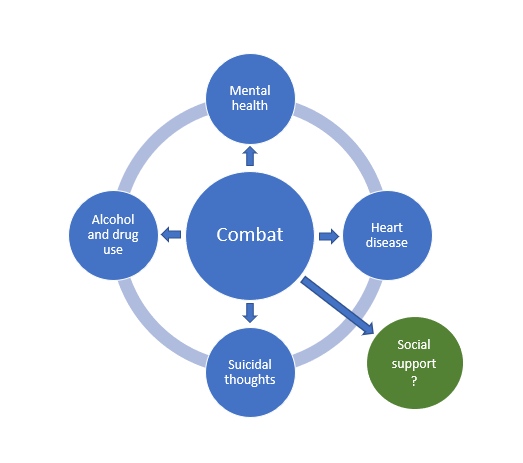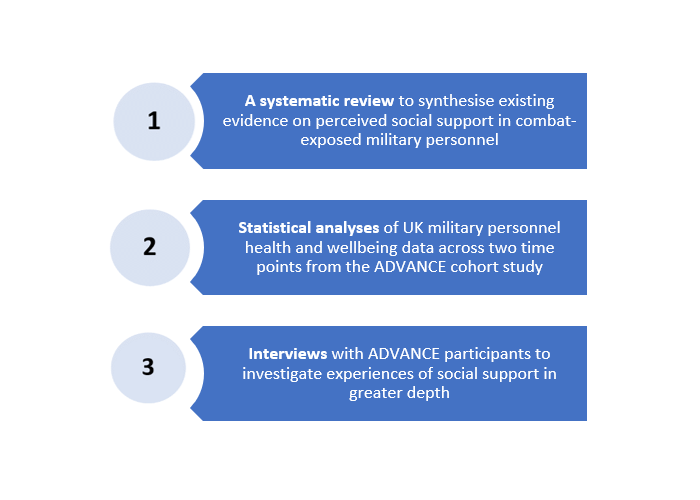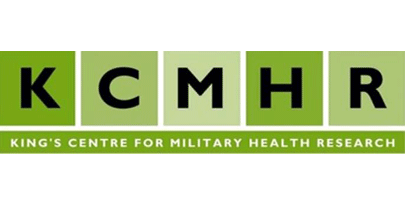The role of perceived social support following combat: associations with psychological and physical trauma

Laura Grover is conducting a PhD within the Armed Services Trauma Rehabilitation Outcome (ADVANCE) study, supervised by Professor Nicola Fear, Dr Howard Burdett and Dr Laura Palmer
Military personnel who have been exposed to combat face unique challenges in multiple domains of life, including psychological, social and occupational. The ADVANCE study aims to understand the health trajectories of UK military personnel who were physically or psychologically affected by combat. This PhD aims to fill a research gap by investigating the potential effects of perceived social support within this cohort.
Research to date has examined the impact of combat deployment on mental health, heart disease, suicidal thoughts and alcohol and drug use. However, less is known about the patterns of perceived social support following combat, and its relationship with wellbeing outcomes.

Perceived social support refers to a person’s beliefs about how much support is available from their relationships, including quality of support. This may come from romantic partners, family members, friends, neighbours, or colleagues. Humans are innately social beings and researchers have long acknowledged that human development is shaped by interpersonal interactions. For example, in Maslow’s hierarchy of needs, belonging and social needs appear directly after safety needs, illustrating the necessity of social relationships for optimal wellbeing.
Studies have indeed shown that supportive social networks are protective during times of stress and aid recovery from mental and physical health problems, in a variety of populations and contexts. In the general population, higher levels of perceived social support may reduce risk for developing mental health problems by up to 50%.
How does this relate to the military?
The unique characteristics of military culture may give rise to differences in social relationship structures compared to civilians. Comradery and peer-bonding is central to the military experience and is linked to positive wellbeing and personal growth, whilst connection with family and friends is often disrupted during military service, especially during deployment. Leaving the military may lead to reconnection challenges for many, and this may be more pronounced in those leaving with a physical injury or psychological problems.
Studies have shown social support, unit cohesion and feeling able to talk about personal problems has been linked to an increase in mental health help-seeking behaviours and reduced risk of probable post-traumatic stress disorder. Social support may also contribute to problematic behaviours such as increased alcohol or drug use.
Potential means by which social support may affect wellbeing that I intend to examine include:
- Promoting positive readjustment to civilian life after deployment
- Providing an outlet to discuss and process traumatic events
- Reducing social isolation and loneliness
- Giving coping strategies to help alleviate chronic pain following combat injury
Overall, this project aims to explore (1) the role of perceived social support following combat, (2) whether perceptions of social support differ in those with a physical combat injury and (3) the effects of perceived social support on psychological trauma.
How will this be done?
This PhD will consist of three key components:

Why now?
Following the recent conflicts in Iraq and Afghanistan, and with advances in healthcare, the number of military personnel who survived with life-long injuries has increased. Wounds to extremities are higher than in previous conflicts due to increased use of explosive devices, and health outcomes in this population are relatively unexplored. It is important to understand the psychosocial support mechanisms behind rehabilitation to inform the current and future health and wellbeing needs of combat-exposed military personnel.
Interested in finding out more about ADVANCE?
For information relating to the wider study:
https://www.advancestudydmrc.org.uk/
For updates as the study progresses, follow:
@AdvanceStudy and @lauragrover_64 on Twitter.
Funding
This PhD is funded through the Armed Services Trauma Rehabilitation Outcome (ADVANCE) Charity. Key contributors to this charity are the Headley Court Charity (principal funder), HM Treasury (LIBOR Grant), Help for Heroes, Nuffield Trust for the Forces of the Crown, Forces in Mind Trust, National Lottery Community Fund, Blesma - The Limbless Veterans and the UK Ministry of Defence.
